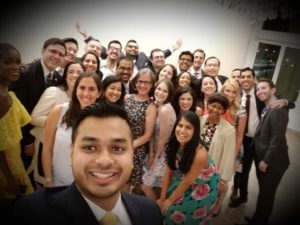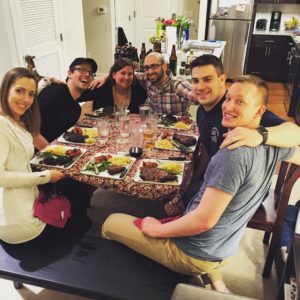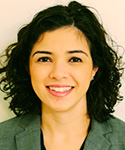January 5th, 2019
I Call BS on Work–Life Balance
Ellen Poulose-Redger, MD
Physician wellbeing, burnout, and “work-life balance” are pretty common topics in training. We start at intern orientation, discussing how to work 80 hours a week, eat, sleep, exercise, and still have some semblance of a social life. It’s like we’ve forgotten the origins of our job title: “resident” or “house staff” — implying that, until recently (and even now, in places outside of North America), we, the physicians-in-training, lived at the hospital. And that sometimes (often times), we still spend more time at the hospital or clinic than we do anywhere else in a week. There are 168 hours in a week, and just under half of them are considered reasonable for us to work. That’s double a “normal” full-time job (40 hours/week).
I’m definitely not saying that medical training, should be shorter or encompass fewer hours. If anything, sometimes it feels like it should be longer (or maybe that’s just the slight fear of my first “attending” shifts coming up — because now it really is my call on things). We have huge responsibilities, and that responsibility requires intensive training. In all honesty, another key component of medical training is the lesson that we are all life-long learners — that our education cannot and does not stop simply because we graduate, get an attending job, and go into practice. There it is again — a word that, if we look at it, reveals the origins of medicine. We practice. We try things, we learn new things, we keep working at getting better. This is not to say that the first patients I see on my own will be poorly taken care of, but just that (as with many professions) we all get better at our jobs over time. We hone that sixth sense, trust our guts a little more, get better at pattern recognition, and know when to call other experts to help us and our patients. We keep practicing, trying to make perfect.
That search for perfection is inherent to many physicians. As a group, we are type A, driven, competitive people. It is one of the things that allows us to give nearly a decade of our lives to school and training to do our jobs — prime years, usually in our 20s and 30s. Those same years, though, are the ones when other people are starting careers, developing hobbies and interests, buying first homes, and starting a family. When we do go looking for our first jobs (as residents, fellows, and first-time attendings), we are expected to be ambitious, well-rounded, compassionate, and well-developed people, not automatons. So, during our medical training, we have to fit a life into the 88 hours per week when we are not at work.
This brings me back to the idea of balance. I take issue with the phrase “work–life balance.” When I picture a balance, I picture something where the two sides offset each other, like old-fashioned scales. With this picture in mind, then, work–life balance would mean that the two sides are equal. In my 88 hours of “personal” time each week during residency, I drive to and from work (round trip totaling at least 1 hour each day), sleep (hopefully at least 7 hours each day), shower/get ready for the day (and, since I’m a girl, that realistically takes an hour each day), and cook/eat/do laundry/clean my apartment/see my husband. That doesn’t really leave a lot of time for any sort of a life, hobbies, research, or anything else that would help me to be a thriving and well-rounded person. Something always gives when people are busy (regardless of their field), and it is usually their personal lives.
a balance, I picture something where the two sides offset each other, like old-fashioned scales. With this picture in mind, then, work–life balance would mean that the two sides are equal. In my 88 hours of “personal” time each week during residency, I drive to and from work (round trip totaling at least 1 hour each day), sleep (hopefully at least 7 hours each day), shower/get ready for the day (and, since I’m a girl, that realistically takes an hour each day), and cook/eat/do laundry/clean my apartment/see my husband. That doesn’t really leave a lot of time for any sort of a life, hobbies, research, or anything else that would help me to be a thriving and well-rounded person. Something always gives when people are busy (regardless of their field), and it is usually their personal lives. 
I don’t necessarily have a way to fix this: We need long and intensive medical training to be good at our jobs. We need to find time to sleep and take care of ourselves so that we can first do no harm (to ourselves). I just don’t think it is fair to say we are striving for balance, because we aren’t. We are striving for survival, until the next step in our careers, when we might get more time for ourselves. We are putting off relationships, families, houses, retirement funds, and many other things while we train. Maybe one way to help with this is to develop robust programs at every institution to help trainees (and honestly, all physicians) accomplish some of these life tasks (e.g., laundry, food, cleaning services). But I think one (free) thing that would to help with this is to just stop calling it “work–life balance” and admit that it will always be unequal and weighted toward work while we are in training, and perhaps for a large part of our careers. One of my husband’s attendings once told him that you can have two out of three: family, fame, or fortune — but not all three. Something will always give in medicine. It’s just easier to accept that we’re giving up something if we don’t pretend we can have it all.




Not all of us are type A. Thanks.
Hi, Dan!
You are correct–many physicians are Type A personalities, but certainly not all of us! Hope you have a great day!
ellen,
so sad that you are looking for fame or fortune in medicine…. wrong profession to be in, then, dear.
and ” and, since I’m a girl, that realistically takes an hour each day” — rather sexist, gender-based stereotype. i am a girl — it realistically takes a maximum of 5 minutes for me to shower and get ready.
keep trying. disappointed to read this article. and too much profanity — bs — seriously? this is what you were trained to speak. so much for good family values, but then perhaps, you come from such low level of humanity. you can keep trying to be a better person and not be a poor role model for patients.
that is a little unfair…it is a platform to express opinions…there is no profanity in the article….if you personally feel attacked by her opinions, that’s your problem… stop over reacting to everything. she speaks the truth.
how rude of you to comment on low level of humanity…someone who puts down someone for voicing their opinions is the one with low level of humanity…like you
i am a girl — it realistically takes a maximum of 5 minutes for me to shower and get ready.
Really? Time yourself please. Create a spreadsheet. I will accept once i see an objective study of the time it takes for you to prepare in the morning.
Burnout sometimes comes in form of bitterness. Maybe taking a little bit more time for yourself would brighten your life. 🙂 Get well.
Hello, Gabrielle!
I am sorry that I offended you with this opinion piece–what I’m trying to convey here, albeit perhaps imperfectly, is that I want to be good at my job and be known as a good physician (even if it’s just to my patients and my immediate colleagues). Fortune isn’t my goal; as you point out, it isn’t something that happens to most physicians, and really isn’t why a large chunk of us go into medicine at all. But, being compensated for the time, effort, and energy that I have put into my training and my work is a fair thing to ask for.
You raise a good point that I could get ready more quickly to go to work–and if needed, I do–but for me, part of self care is taking that time for myself to eat an actual breakfast and drink a cup of coffee before I go to work in the morning/evening.
Anyway, I thank you for your time to read my opinions, and I hope that you have a good day.
I call BS (excuse my profanity) your response. Don’t call her “dear” and the proceed to call her out for using a gender-based stereotype. She’s a doctor and deserves to be address as such.
You attack her “good family values,” her low level of humanity. Seriously you need to look in the mirror. Your response was defensive, pedantic, patronizing, and you are obviously PROJECTING some of your own insecurities onto this author, who wrote a great piece on this subject. Your response literally had NOTHING to do with the subject matter.
I’m not even going to address your otherworldly claim that you shower and get ready in under 5 minutes.
You are the attending that residents can’t stand to work with because you are everything that is wrong with medicine. You should be ashamed.
I am halfway through my training in general medicine in Australia, and am constantly surprised at the American view that it takes 80+ hour weeks to train a competent doctor. My colleagues and I generally work a very civilised 45-50 hour week, or occasionally up to 60 hours, making work-life balance very achievable. This seems to be the norm in much of Europe as well. I do not think that our system creates inexperienced, poorly trained doctors, and I would be interested to see any evidence behind your claims that long hours are required for competency.
Hi, Kate!
I, too, would be very interested in seeing if there are any differences between the physicians that come out of American vs. Australian or European training backgrounds. Although I have no direct experience with physicians who trained in other countries, I would agree with you that you all are not poorly trained. If I had to guess, I’d say that part of our long hours in training in the US also goes back to how our entire healthcare system is designed–which is another topic for another day. Good to hear from you!
Interesting post. I recently listened to two different sources that remarkably said very similar things in two different contexts. One was a podcast episode on “burnout” and depression on the podcast, “The Curbsiders.” Excellent podcast BTW, but guest, who is a physician herself, states that better to view this connundrum as a spectrum. At some points in your training or career, your work life wins out and gets more than 50% of your energy. And at later times, when you are taking your kids to school, and soccer practice, or music lessons, your home life wins out and you give more than 50% to this. I think the most important thing to realize is that this is OK, and to accept that we will try to make the best decision we can at any one given time. We do give up quite a lot in our training, but we gain some things as well in return.
Finally, recently finished a book called “Daring Greatly” by Brenee Brown. Brings up several really intriguing concepts, but one that applies most directly here is realizing what expectations are for our sex (M or F) and our age, and accepting some of them, but also modifying some of them to meet our needs. In reality, there is no one “perfect” way to do anything, and we are best to accept that each choice we make has ramifications. I will never have a child in my 30’s like some of my colleagues or friends who never entered medicine, but my life is different and that is OK. Just recognize that if you make the best decision for you at any one given point in time, that is what is meant to be. You don’t get any extra points or credit for torturing yourself with the what ifs… Make a decision and move on, because we can’t change the past and will never really know what might have happened if we did _______. Hope that helps !
Hello, Sean!
Yes, a continuum or spectrum is probably a much better way to look at the relationship between work and “life.” We definitely gain a lot of things during medical training, and we lose out on others. That was absolutely something I considered before starting my training, and something I considered when I married another physician in training, and something we both consider as we look at starting our family. You give good advice that making decisions and moving on from them is what I (we) need to do in my “personal” life (it’s what we do in medicine in our professional life!).
Thanks!
I know that medical school is demanding, but you have to still have a social life.
@gabrielle, we should be supporting each other through this process rather than mocking and belittling others for expressing their perspective, and we certainly do not need more bullying in medicine!
I love your article and we female surgery residents often discuss this matter and how unachievable it is. Someone also told us in our first week as general surgery residents that “you can be 100% of anything, but never at the same time”. The way they explained it was, one day you have to not read on a surgery so you can go on a “date night” with your husband. Maybe research can wait, so you can take your kid to soccer practice and be a good mom.
I understand what you are trying to say, and our profession is all about “criticism”, that is how you improve, and I give those bitter comments the benefit of the doubt. Thank you for sharing your story, your struggle. There are plenty of us out there who “get it”, and have the ability to see the message you are trying to convey without picking it apart. Thank you for taking your time. Best of luck as an attending, you got this! 🙂
Sort of funny to see a medicine resident whining about work hours. Try spending one day in any surgical subspecialty. I’ve usually been running around the hospital for 3-4 hours before I see the medicine residents coming in to work. But I don’t complain. I’m getting good training. My wife understands the value of the time I put into my work. It’s of course always a struggle, but I’d still say I have a good work/life balance.
I thought this was a very well written article that hit home in many ways for me as a current 3rd year resident.
Gabrielle, why even comment if you have nothing useful to say? The author is clearly not looking for fame and fortune (I think we all know that’s not the goal in medicine). She was just using an example phrase. I’ve heard the similar “you can have 2 in med school: good grades, sleep, or a social life.” And please get over your own gender stereotype offense taken. It absolutely can take an hour sometimes to thoroughly wash hair, clean, shave, lotion, whatever people need to do for personal hygiene. Good for you if you don’t need time to do some of those things, but it’s a reality for most. And it takes away from what precious time we have in the day when we’re in training.
Thank you for your well-written article. As a 4th year medical student, I am glad to have stumbled upon this article and it’s important message. Starting residency in a few short months, I have a glimpse of what to expect from my rotations, but it’s hard to know exactly how the next few years will look. As you point out, not setting the expectation of complete balance between work and personal life is an important place to start. Part of this is the unrealistic pressure to “do it all,” a mantra physicians (especially female physicians) often pride themselves on. We’re often told we can be healthy, smart, social, well-rested and a good physician… when, in reality there are not enough hours in the day! Thank you for writing about this topic!